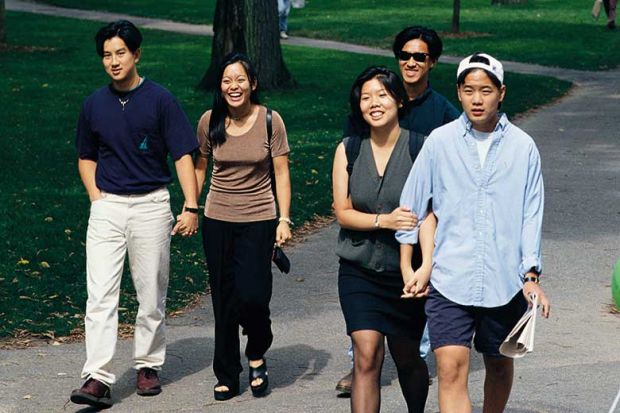In a lawsuit with national implications, Michael Wang is contending that his Asian American ethnicity led to his rejection as a candidate for admission to Harvard University.
But to judge by the proportional make-up of enrolments, however, Mr Wang might have had a far stronger argument – in logic if not in law – had he instead emphasised that his parents were neither alumni nor major donors to Harvard.
That’s because ethnic Asians make up about 23 per cent of Harvard’s undergraduate class but only 6 per cent of the US population. Harvard alumni, meanwhile, constitute about 0.1 per cent of the US population, yet their children or close relatives manage to claim about 30 per cent of all undergraduate places.
By measures such as standardised test performance, Mr Wang’s team has argued in federal court in Boston, Asian Americans should be getting even more than that 23 per cent level. But others contend that low-income applicants educated in low-quality public schools should be recognised for attributes that standardised tests may not capture, and that favouritism towards wealthy alumni is, therefore, the far bigger fundamental unfairness in Harvard’s admissions practices.
Those critics include Evan Mandery, a Harvard alumnus who is now a professor of criminal justice at the City University of New York, who has been outspoken in his discomfort with his alma mater’s “legacy” preference for its alumni kin.
“Whatever the legal merits of Harvard’s position in this particular lawsuit, and hypothetical other claims,” Professor Mandery said of the Wang case, “their behaviour is ethically indefensible.”
Yet Mr Wang’s decision to emphasise his Asian American heritage, rather than the apparently more determinative numerical disadvantage that he faced because of his lack of alumni ties, points to a couple of factors unlikely to change any time soon.
One, Harvard alumni have shown for decades now that, while they largely embrace notions of racial diversity, they seem far less likely to advocate for class diversity and to accept the loss of family privilege that would come with ending legacy preferences.
Second, despite the nation’s slow long-term progress in reducing overt manifestations of racial discrimination, class-based discrimination appears much more intractable.
In fact, it’s not even illegal. If Mr Wang had not been willing to serve as a public face for conservative activists working to restrain racial integration, he likely would have little luck in suing Harvard for choosing a competing applicant with family wealth and alumni ties.
That’s because US law does not recognise such a problem. Simply put, said Natasha Baker, a higher education lawyer in California, US law permits favouring legacy applicants as a “permissible means of discrimination”.
Federal laws enacted in 1964 and 1972 banned discrimination on the basis of race and gender in education programmes that use federal money. Other than those two statutes, there is no legal basis for someone to challenge discrimination involving factors such as economic class.
So beyond those two issues of race and gender, Professor Mandery said, universities including Harvard have broad leeway. “Ultimately,” he said, “Harvard has the right to shape its class in any way that it wants that isn’t illegal.”
That’s a different question, Professor Mandery and other critics say, from what Harvard should be doing. Yet Harvard’s preference for applicants with alumni ties is not the only way that it disproportionately helps whiter and wealthier candidates. It also sets aside slots for student athletes and offers an early acceptance process, both of which tend to work against minority and poorer applicants.
Professor Mandery said that Harvard deserved credit for allocating some of its vast economic resources to help fix past injustices. “It’s just that they’re giving away tons of it to reinforce these inequalities.”
Register to continue
Why register?
- Registration is free and only takes a moment
- Once registered, you can read 3 articles a month
- Sign up for our newsletter
Subscribe
Or subscribe for unlimited access to:
- Unlimited access to news, views, insights & reviews
- Digital editions
- Digital access to THE’s university and college rankings analysis
Already registered or a current subscriber? Login








